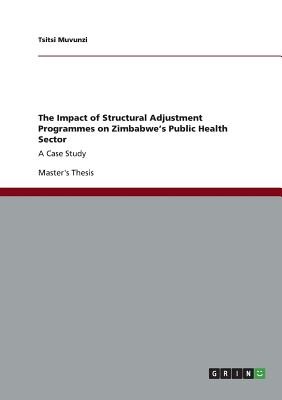
- We will send in 10–14 business days.
- Author: Tsitsi Muvunzi
- Publisher: GRIN Verlag
- Year: 2013
- Pages: 132
- ISBN-10: 3656415781
- ISBN-13: 9783656415787
- Format: 14.8 x 21 x 0.8 cm, softcover
- Language: English
- SAVE -10% with code: EXTRA
The Impact of Structural Adjustment Programmes on Zimbabwe's Public Health Sector (e-book) (used book) | bookbook.eu
Reviews
Description
Master's Thesis from the year 2011 in the subject Politics - Topic: Development Politics, grade: 80%, Ewha Womans University (Graduate School of International Studies), course: International Studies, language: English, abstract: ABSTRACT Structural Adjustment Programmes (SAPs) of the IMF (IMF) and World Bank (WB) were implemented as part of aid conditionality in Africa and Latin America since the 1980s. There is a wide range of literature critical of SAPs. Several debates have focused on whether the failure of SAPs was a result of the inherent weaknesses of the IMF/ WB sponsored structural adjustment or whether it was caused by structural failures of policy implementation within the African continent. The author uses the Zimbabwean case to analyze the impact of SAPs on social service sectors, particularly the public health sector. This paper provides a case where the Zimbabwean health sector demonstrated significant progress in public health delivery, and showed prospects of further improvements before the implementation of structural adjustment between 1990 and 2000. In this thesis I show that cost recovery systems and reduced public expenditure on health led to rising costs of health services and increased inequalities in health service provision. It also resulted in the abandonment of critical public health programmes and consequently contributed to poor funding for health infrastructure, maintenance, drugs and equipments. Furthermore, retrenchments in the public health sector robbed it of critical and well qualified staff and exacerbated brain drain. SAPs were implemented amid public protests and demonstrations by the general public and organized interest groups. This is not only because they brought negative impacts on livelihoods but also because there were little consultations between the government and civil society prior to their implementation. This paper also illustrates that, to a larger extend SAPs increased women's care burden and worsened their health
EXTRA 10 % discount with code: EXTRA
The promotion ends in 19d.20:15:34
The discount code is valid when purchasing from 10 €. Discounts do not stack.
- Author: Tsitsi Muvunzi
- Publisher: GRIN Verlag
- Year: 2013
- Pages: 132
- ISBN-10: 3656415781
- ISBN-13: 9783656415787
- Format: 14.8 x 21 x 0.8 cm, softcover
- Language: English English
Master's Thesis from the year 2011 in the subject Politics - Topic: Development Politics, grade: 80%, Ewha Womans University (Graduate School of International Studies), course: International Studies, language: English, abstract: ABSTRACT Structural Adjustment Programmes (SAPs) of the IMF (IMF) and World Bank (WB) were implemented as part of aid conditionality in Africa and Latin America since the 1980s. There is a wide range of literature critical of SAPs. Several debates have focused on whether the failure of SAPs was a result of the inherent weaknesses of the IMF/ WB sponsored structural adjustment or whether it was caused by structural failures of policy implementation within the African continent. The author uses the Zimbabwean case to analyze the impact of SAPs on social service sectors, particularly the public health sector. This paper provides a case where the Zimbabwean health sector demonstrated significant progress in public health delivery, and showed prospects of further improvements before the implementation of structural adjustment between 1990 and 2000. In this thesis I show that cost recovery systems and reduced public expenditure on health led to rising costs of health services and increased inequalities in health service provision. It also resulted in the abandonment of critical public health programmes and consequently contributed to poor funding for health infrastructure, maintenance, drugs and equipments. Furthermore, retrenchments in the public health sector robbed it of critical and well qualified staff and exacerbated brain drain. SAPs were implemented amid public protests and demonstrations by the general public and organized interest groups. This is not only because they brought negative impacts on livelihoods but also because there were little consultations between the government and civil society prior to their implementation. This paper also illustrates that, to a larger extend SAPs increased women's care burden and worsened their health


Reviews